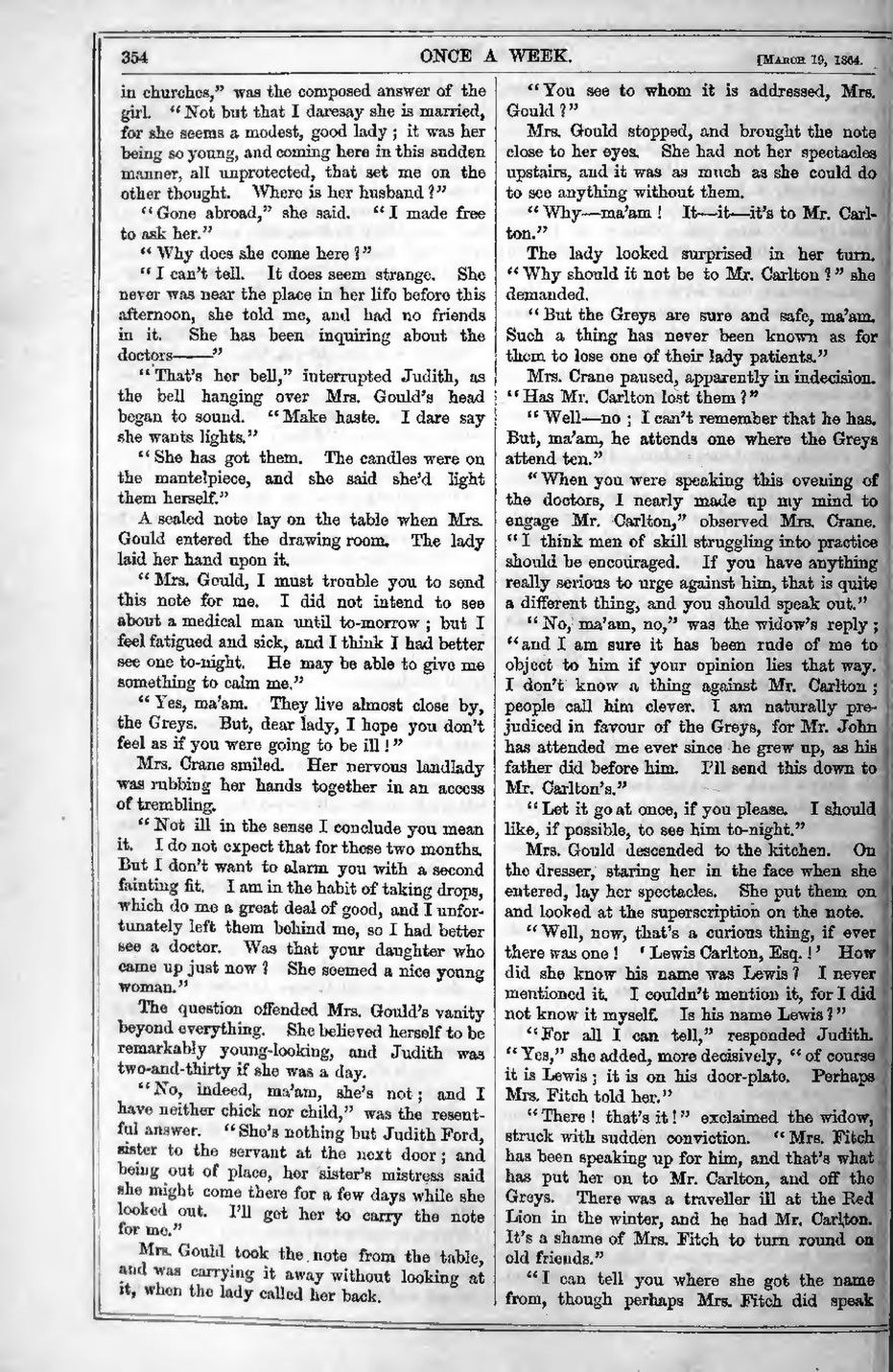in churches,” was the composed answer of the girl. “Not but that I daresay she is married, for she seems a modest, good lady; it was her being so young, and coming here in this sudden manner, all unprotected, that set me on the other thought. Where is her husband?”
“Gone abroad,” she said. “I made free to ask her.”
“Why does she come here?”
“I can’t tell. It does seem strange. She never was near the place in her life before this afternoon, she told me, and had no friends in it. She has been inquiring about the doctors———"
“That’s her bell,” interrupted Judith, as the bell hanging over Mrs. Gould’s head began to sound. “Make haste. I dare say she wants lights.”
“She has got them. The candles were on the mantelpiece, and she said she’d light them herself.”
A sealed note lay on the table when Mrs. Gould entered the drawing room. The lady laid her hand upon it.
“Mrs. Gould, I must trouble you to send this note for me. I did not intend to see about a medical man until to-morrow; but I feel fatigued and sick, and I think I had better see one to-night. He may be able to give me something to calm me.”
“Yes, ma'am. They live almost close by, the Greys. But, dear lady, I hope you don’t feel as if you were going to be ill!”
Mrs. Crane smiled. Her nervous landlady was rubbing her hands together in an access of trembling.
“Not ill in the sense I conclude you mean it. I do not expect that for these two months. But I don’t want to alarm you with a second fainting fit. I am in the habit of taking drops, which do me a great deal of good, and I unfortunately left them behind me, so I had better see a doctor. Was that your daughter who come up just now? She seemed a nice young woman.”
The question offended Mrs. Gould’s vanity beyond everything. She believed herself to be remarkably young-looking, and Judith was two-and-thirty if she was a day.
“No, indeed, ma'am, she’s not; and I have neither chick nor child,” was the resentful answer. “She’s nothing but Judith Ford, sister to the servant at the next door; and being out of place, her sister’s mistress said she might come there for a few days while she looked out. I’ll get her to carry the note for me.”
Mrs Gould took the note from the table, and was carrying it away without looking at it, when the lady called her back.
“You see to whom it is addressed, Mrs. Gould?”
Mrs. Gould stopped, and brought the note close to her eyes. She had not her spectacles upstairs, and it was as much as she could do to see anything without them.
“Why—ma'am! It—it—it’s to Mr. Carlton.”
The lady looked surprised in her turn. “Why should it not be to Mr. Carlton?” she demanded.
“But the Greys are sure and safe, ma'am. Such a thing has never been known as for them to lose one of their lady patients.”
Mrs. Crane paused, apparently in indecision. “Has Mr. Carlton lost them?”
“Well—no; I can’t remember that he has. But, ma'am, he attends one where the Greys attend ten.”
“When you were speaking this evening of the doctors, I nearly made up my mind to engage Mr. Carlton,” observed Mrs. Crane. “I think men of skill struggling into practice should be encouraged. If you have anything really serious to urge against him, that is quite a different thing, and you should speak out.”
“No, ma'am, no,” was the widow’s reply; “and I am sure it has been rude of me to object to him if your opinion lies that way. I don’t know a thing against Mr. Carlton; people call him clever. I am naturally prejudiced in favour of the Greys, for Mr. John has attended me ever since he grew up, as his father did before him. I’ll send this down to Mr. Carlton’s.”
“Let it go at once, if you please. I should like, if possible, to see him to-night.”
Mrs. Gould descended to the kitchen. On the dresser, staring her in the face when she entered, lay her spectacles. She put them on and looked at the superscription on the note.
“Well, now, that’s a curious thing, if ever there was one! ‘Lewis Carlton, Esq.!’ How did she know his name was Lewis? I never mentioned it. I couldn’t mention it, for I did not know it myself. Is his name Lewis?”
“For all I can tell,” responded Judith. “Yes,” she added, more decisively, “of course it is Lewis; it is on his door-plate. Perhaps Mrs. Fitch told her.”
“There! that’s it!” exclaimed the widow, struck with sudden conviction. “Mrs. Fitch has been speaking up for him, and that’s what has put her on to Mr. Carlton, and off the Greys. There was a traveller ill at the Red Lion in the winter, and he had Mr. Carlton. It’s a shame of Mrs. Fitch to turn round on old friends.”
“I can tell you where she got the named from, though perhaps Mrs. Fitch did speak